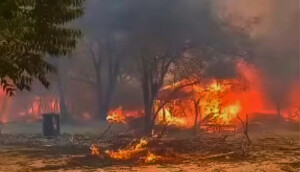‘Darfur possible breeding ground for radical Islam’: UN experts
The latest annual report by the UN Panel of Experts on Sudan said the overall number of aerial bombardments by Sudan has declined in the past year. The pattern of deliberately targeting civilians has resulted in over 3,000 destroyed Darfuri villages in a five-month period.
The latest annual report by the UN Panel of Experts on Sudan, distributed on Friday, said the overall number of aerial bombardments by Sudanese government forces had declined. Sudan has, however, violated the arms embargo by manufacturing small arms ammunition. The experts expressed their concern that the Darfur region might become a breeding ground for radical Islamists.
"The number of Sudanese Air Force assets present in Darfur has dropped to a historic low during the current mandate," the experts wrote about the aerial bombardments in their report, requested by the UN Security Council in resolution 2138 of February 2014.
But they described a "pattern of deliberate targeting of and/or indiscriminate attacks on civilians with actual or perceived allegiance to the armed opposition groups" – as well as sporadic attacks by rebel forces on those believed to support the government. "The effects of this have resulted in 3,324 villages being destroyed in Darfur over the five-month period surveyed by the Darfur Regional Authority, from December 2013 to April 2014," the report said.
It pointed to the deployment of the paramilitary Rapid Support Forces (RSF) to Darfur for the worsening of the conflict during the first five months of 2014. Fighting between Sudanese forces and armed movements has increased since 2013, as a result of the 'Decisive Summer Campaign' by Sudan, in which the RSF took the lead.
Violations of human rights included attacks against civilians in Khor Abeche (22 March 2014) and Birka (20 March 2014), in South and North Darfur respectively, of which the perpetrators were identified as members of the Sudanese security forces. Violations by rebel forces of the SLM-MM occurred in El Taweisha in North Darfur on 4 March 2014, displacing over 81,000 people, according to the report. The experts also found that Abdel Wahid El Nur's rebel troops probably incited protests in the Kalma camp for internally displaced people last August.
They also cited a significant number of new displacements in the region. According to the UN Office for the Coordination of Humanitarian Affairs, nearly half a million people were newly displaced last year in Darfur.
Radical Islam
The experts said the security environment across Libya, the Sahel and the Middle East had deteriorated due to "radical Islamist agitation". They raised concerns about statements from Sudan that the government has supported Libyan rebels.
"The panel finds that Darfur could be 'potentially fertile ground' for infiltration by radical Islamists, owing to its porous borders and the cross-border family solidarity between Sudanese tribes and their African 'cousins' of Arab descent in the Central African Republic, Libya, Mali and the Niger." The experts could not yet verify their assumption in this report.
Arms embargo
Small arms ammunition, manufactured post-2005, was present in Darfur last year. This included ammunition manufactured in Khartoum in 2013; a certain violation of the arms embargo, the experts stressed. They obtained evidence from the continued use of certain improvised air-delivered munitions.
Sexual violence
In recent months, tensions have increased between Khartoum and the UN-African Union peacekeeping mission in Darfur (Unamid). The government asked Unamid in November to prepare an exit plan, after denying peacekeepers permission to re-visit the site of reported mass rapes by Sudanese soldiers in the North Darfur village of Tabit. The panel is "aware" of these allegations and will continue to monitor the situation. The experts said sexual and gender-based violence in Darfur "continue unabated since 2013."
In general, the panel has witnessed an improvement in the cooperation with the Sudanese government. Yet, Khartoum did not always fully accede to their access and information requests, on some crucial matters.
Related articles:
Thousands displaced in attack on more than 35 villages in South Darfur (28 February 2014)
27,000 displaced by rebel attacks in North Darfur (11 March 2014)
Khor Abeche camp in South Darfur laid waste (23 March 2014)











 and then
and then